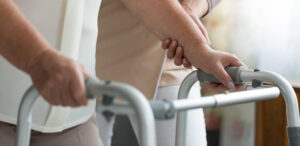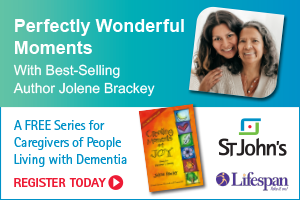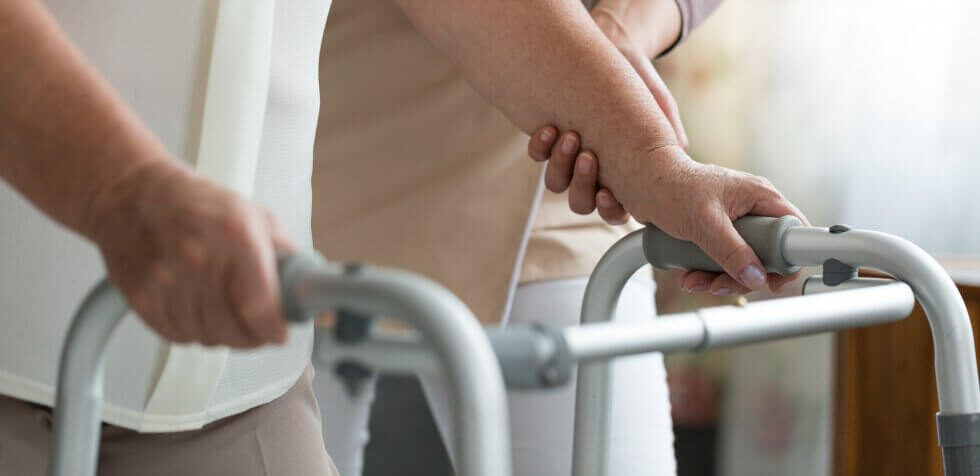American Stroke Association (ASA) created “American Stroke Month” as a way to raise awareness of the severity and commonality of strokes in America. Strokes can occur at any age and having one stoke puts you at higher risk for a second one. The ASA says, “this stroke month let’s come together to defeat stroke.”
According to the National Institute of Neurological Disorders and Stroke (NINDS), about 800,000 people in the United States experience strokes every year. Two-thirds of those people who make it through the stroke end up needing some form of mental and physical rehabilitation.

Stroke rehabilitation involves motor-skill-exercises to help with balance, walking, and even swallowing. Mobility training is also involved, which often consists of using mobility aids, such as walkers, canes, wheelchairs, braces, and more. These aids and learning how to work with those aids can provide support and strength.
Typically, three main types of therapy are used in the rehabilitation process: physical therapy, occupational therapy, and cognitive therapies, which involve speech and psychological.
Every treatment of a stroke patient is unique. Different people have different needs. The Mayo Clinic says, “Some stroke survivors recover quickly. But most need some form of long-term stroke rehabilitation. This could last for possibly months or years after their stroke.”

Along with unique and varying recoveries, the outcomes of a stroke vary as well.
Vascular dementia can develop after a stroke due to blockage of an artery in the brain. Based on a study from ASA, researchers discovered that up to 60% of all stroke survivors develop cognitive impairment within a year and a third develop dementia within five years. The researchers found that the other 40% of stroke survivors had cognitive impairment that did not meet the criteria to be diagnosed with dementia.
So, out of the 800,000 stroke survivors a year in the U.S., 480,000 develop dementia.
What causes this Vascular dementia?
The Mayo Clinic says, “Vascular dementia results from conditions that damage your brain’s blood vessels, reducing their ability to supply your brain with the amounts of nutrition and oxygen it needs to perform thought processes effectively.”
The 60% statistic can be very discouraging. More than half of stroke survivors develop the cognitive disease. This is because of risk factors. The same risk factors for vascular dementia are those for stroke and heart attack.
Risk factors for vascular dementia include:

- Increasing age
- History of stroke of heart attack
- Atherosclerosis, the abnormal aging of blood vessels
- High cholesterol
- High blood pressure
- Diabetes
- Smoking
- Obesity
- Atrial fibrillation, when the chambers of your heartbeat rapidly or irregularly
These risk factors can be further broken down to highlight how much of the U.S. population possess such factors; thereby, increasing their chances of stroke and heart attack, ultimately leading to dementia development.
Risks percentages in the population of 65+
- Increasing age: 54.1 million people 65 and older
- History of stroke of heart attack: 795,000 and 805,000 people
- Atherosclerosis: about 6.5 million people
- High cholesterol: 616,740 people
- High blood pressure: 4.3 million people
- Diabetes: 1.5 million people
- Smoking: 486,900 people
- Obesity: 1.5 million people
- Atrial fibrillation: 486,900 people
With high numbers in all of the risk factor elements of this population, older adults have an increased likelihood to have a stroke and develop dementia.
What to Do Before a Stroke
There are ways to notice a stroke and act effectively to avoid future damage and long-term risk of dementia. The ASA suggests “F.A.S.T.”
F : FACE DROOPING
A : ARM WEAKNESS
S : SPEECH
T : TIME TO CALL 911
What do you or a loved one do after a stroke and how do you prevent cognitive decline?

After a stroke, a doctor will likely perform a neurological exam to see if any brain damage occurred that could result in the development of vascular dementia or Alzheimer’s disease. The doctor will look at your overall neurological health by examining your reflexes, muscle tone and strength, ability to move from one spot to another, senses, coordination, and balance.
Brain imagining may also be required. Neuropsychological tests, which examine different abilities, including working with numbers, speaking, writing, remembering information, planning, and response, may also be performed.
“The health of your brain’s blood vessels is closely linked to your overall heart health,” says the Mayo Clinic. They suggest taking the following steps to keep your brain and heart healthy while reducing your risk of vascular dementia:

- Maintain a healthy blood pressure: Keeping your blood pressure in the normal range by monitoring stress, fatty foods, and alcohol intake, may help prevent both vascular dementia and Alzheimer’s disease.
- Prevent or control diabetes: Avoiding the onset of type-2 diabetes, with diet and exercise, is key in risk-lowering. Managing glucose levels if you already have diabetes should also be a priority.
- Quit smoking: Smoking or consuming tobacco damages blood vessels in your brain and the rest of your body.
- Get physical exercise: Regular, low-impact exercise is beneficial as you age, especially cardio exercises to help your heart.
- Keep your cholesterol in check: A healthy, low-fat, and low-cholesterol diet, along with cholesterol-lowering medications may reduce your risks.
As a Caregiver of a Stroke Victim
As a caregiver for someone recovering from a stroke, it is crucial to write down things you may notice, symptoms your loved one mentions, and questions you may have in preparation for meeting with medical professionals. Dealing with a stroke and its recovery process, with or without the development of dementia, is difficult on the patient, and you, as a caregiver. These are complex health issues, so it is important to stay informed and be a voice for your loved one, when they are not able.










